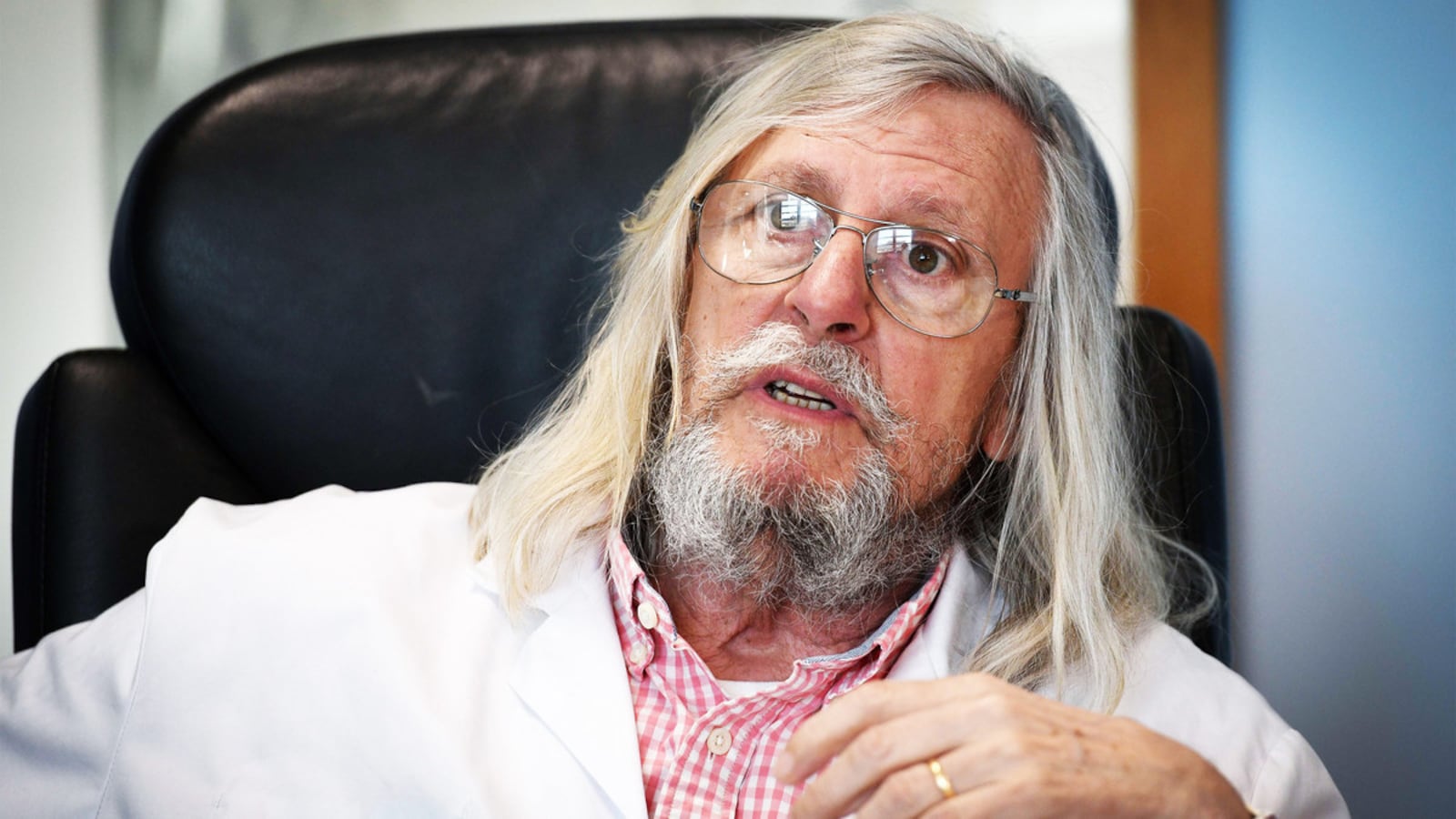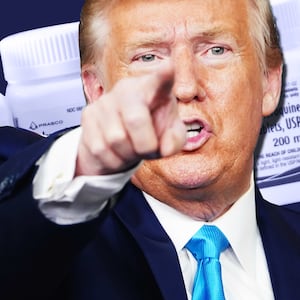PARIS—Brace yourself for a new wave of hydroxychloroquine hype.
The eccentric French researcher whose findings have captured the imagination of Donald Trump and the airtime of enthusiastic Fox News pundits has just published new findings clearly intended to answer his critics.
On Thursday evening, when French President Emmanuel Macron made a previously unannounced visit to Dr. Didier Raoult’s research institute in Marseilles, the doctor reported that his staff had treated 1,061 patients with confirmed cases of COVID-19 employing hydroxychloroquine (HCQ), a common anti-malarial drug, and the antibiotic azithromycin (AZ).
The eye-popping result, according to the two-page paper Raoul made public: “98 percent of patients cured so far.” After 10 days of treatment, Raoult claims, 91.7 percent were rid of the virus, while a mere 4.3 percent had “a poor outcome,” with 10 patients moved to the ICU, and five dead. And in those latter cases, the paper notes they were between 74 and 95 years old.
If these results are accurate and the treatment with readily available drugs is as good as all that, then it might be made to seem the COVID-19 pandemic isn’t such a big deal, despite more than 100,000 deaths around the globe as of this writing. If only the world had listened to Dr. Raoult when he promoted his first conclusions earlier this year based on a sampling of 24 patients.
But there are quite a few reasons Raoult’s results have not been embraced en masse, some of which have to do with methodology, and some with the man himself.
Raoult, 68, has long cultivated his image as a scientific iconoclast and a social eccentric, with long hair and a beard that gives him the allure of a latter day Wild Bill Hickok, albeit in a medical researcher’s white coat. He wears a biker ring and adorns the walls of his office with schlock paintings of, among others, an imposing Poseidon, god of the seas. Some would say he sees himself in that deific mold.
Why such affectations in a world of pretty conservative researchers? “Because that pisses them off,” he once told a reporter.
Raoult’s stick-it-to-the-man persona is beloved by French right-wing politicians as well as Trump and his acolytes in the United States. And Raoult is not above currying favor with them by staking out “scientific” positions far afield from his own expertise.
Year after year, Raoult has declared climate change predictions “absurd” and stated flatly “Earth is not warming.” Indeed, contrary to virtually unanimous opinion by scientists who really are experts in climatology, Raoult has insisted the world is actually cooling.
As a recent profile in the respected French daily Le Monde pointed out, Raoult was mocking the COVID-19 threat in January. When the Chinese locked down Hubei province on Jan. 21, Raoult called the move “delirious” in one of his institute’s YouTube broadcasts. “There are three Chinese who die and that causes a worldwide alert, the WHO [World Health Organization] gets involved, people talk about it on television and radio. … All that’s crazy, there’s no lucidity.”
But that was, oh, 100,000 deaths ago. And now, Raoult says, he’s got the cure, and a big enough sample of cases to prove it.
Don’t we all hope that’s true? Of course we do. But science has its exigencies, and the scientific community is deeply skeptical about several aspects of Raoult’s findings for some very specific reasons. He may have won over Trump with his initial findings, but he certainly succeeded in pissing off other professionals by making scientific claims using less than scientific methods, and then sniping at them personally.
Of Dr. Anthony Fauci, the director of the National Institute of Allergy and Infectious Diseases (NIAID) who has become the most trusted figure in the U.S. administration’s task force during this crisis—and who repeatedly expresses skepticism about Raoult’s findings, even contradicting Trump? Raoult said dismissively “he must have become spoiled” by all the attention.
The idea of using chloroquine and its cousin, hydroxychloroquine, to treat the virus didn’t begin with Raoult. The COVID-19 pandemic spurred scientists around the world to look at a range of drugs with antiviral effects in the hopes of finding something that could mitigate symptoms in the infected.
Like a lot of approaches to SARS-CoV-2, the virus that causes COVID-19, chloroquine gained steam because of research into previous outbreaks from a member of the coronavirus family. After the Severe Acute Respiratory Syndrome (SARS-CoV-1) outbreak in 2003, researchers then, as now, looked for quick, off-the-shelf therapies that could treat it faster than developing a drug from scratch. Early study into chloroquine theorized that the antimalarial drug could change the acidity of endosomes—tiny little pits in cells where the SARS virus binds—and make them inhospitable places for the virus’s spike protein to attach. Research into the effect of chloroquine on SARS-infected primate cells in a lab appeared to support that theory.
As early as Feb. 4, Chinese researchers published a letter in Nature that summarized their lab research into the effect of a range of drugs against cells infected with COVID-19. The team, led by scientists from the Wuhan Institute of Virology, found some promising indications that both chloroquine and the anti-Ebola drug remdesivir might be effective in a clinical setting. By Feb. 17, Chinese officials claimed that at least 10 hospitals in the country were using chloroquine in clinical trials.
So, Raoult was not the first scientist to investigate chloroquine’s use against COVID-19, but he was the loudest. In mid-March, his study of some 20 patients who’d been treated with the drug hit Twitter and became an overnight sensation.
By then the social media ecosystem already was primed for celebrity drug endorsement. Columbia doctor and blockchain investor James Todaro published a Google doc on Twitter that got the attention of Elon Musk with an argument for chloroquine usage based on the Chinese research.
Academics and researchers weren’t as enthusiastic about Raoult’s work as the scientific laity for a number of reasons: the small sample size, the removal of patients from the study who died or had to be sent into intensive care, the fact that patients receiving the treatment were non-randomized.
In the wake of the controversy over Raoult’s research, the International Society of Antimicrobial Chemotherapy, whose journal published the study, issued a statement saying it shared many academic concerns. “The ISAC Board believes the article does not meet the Society’s expected standard,” it wrote.
Still, meticulous research continues—by others—and scientific opinion on chloroquine’s effectiveness is unlikely to hinge on Raoult alone. By the time Raoult announced his initial results in March, the World Health Organization already was gearing up for clinical trials of the drug as part of its Global Solidarity Trials, a massive international effort to research the effect of a handful of promising drugs against the novel coronavirus.
Other academic groups already are doing their own work on the drug. Researchers at the University of Minnesota are trying to recruit 1,500 people for a clinical study that aims to see whether or not chloroquine can prevent people like healthcare workers from becoming infected. In March, New York Governor Andrew Cuomo announced that New York state would launch its own trial of the drug in those already sickened.
Meanwhile, some are beginning to doubt whether chloroquine can live up to the hopes pinned on it. One hospital in Sweden stopped prescribing the drug to sickened patients after severe side effects among patients made doctors question whether any unproven coronavirus-fighting effects of the drug outweighed its documented and sometimes severe side effects.
One small recent study from China also found that 30 COVID-19 patients treated with the drug experienced no significant improvements over standard care.
Perhaps tellingly, earlier this month the U.S. Centers for Disease Control and Prevention quietly removed from its website what Reuters reported as “highly unusual guidance informing doctors they had the option to prescribe the drugs, with key dosing information based on unattributed anecdotes rather than peer-reviewed science.”
With Raoult’s new report, perhaps some patients will be saved, perhaps some will die. But new life will be breathed into the debate about the French scientist’s findings. Which, it would seem, is precisely what he intended.








